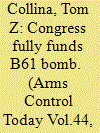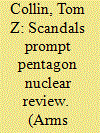|
|
|
Sort Order |
|
|
|
Items / Page
|
|
|
|
|
|
|
| Srl | Item |
| 1 |
ID:
129134


|
|
|
|
|
| Publication |
2014.
|
| Summary/Abstract |
Striking a compromise on a controversial issue, Congress in January passed legislation to provide $537 million, the full amount the Obama administration had requested, for the program to rebuild the B61 nuclear gravity bomb and require the administration to submit detailed reports on alternatives to this plan. Congress also mandated the eventual retirement of a different gravity bomb, the B83, once the B61 is ready for service. These items were part of an omnibus appropriations bill signed by President Barack Obama on Jan. 17. The new law is a $1.1 trillion conglomeration of 12 appropriations bills that had to be passed to keep the government open for the remainder of the fiscal year, which ends Sept. 30. The legislation includes $7.8 billion for nuclear weapons activities conducted by the Energy Department's semiautonomous National Nuclear Security Administration (NNSA). One of the key nuclear policy questions left unresolved last year was how much money the NNSA would be allowed to spend to extend the service life of about 400 B61 gravity bombs. About half of the B61s are stored in European NATO countries for use on tactical, or short-range, aircraft; the rest are stored in the United States for use on strategic, or long-range, bombers.
|
|
|
|
|
|
|
|
|
|
|
|
|
|
|
|
| 2 |
ID:
174483


|
|
|
|
|
| Summary/Abstract |
In May 2020, a debate erupted in Germany on the future of NATO nuclear sharing and Berlin’s participation in the arrangement that has seen U.S. nuclear weapons deployed in European nations for decades. This may well turn out to be an opportunity for the alliance, European security, and arms control. Even though it might not sound very realistic today, within the next five years the United States could withdraw the tactical weapons it deploys in Europe with no negative consequences for NATO unity and the security of Europe. In order to secure such an outcome, German leaders and NATO policymakers will have to combine reassurance and arms control in novel and smart ways.
|
|
|
|
|
|
|
|
|
|
|
|
|
|
|
|
| 3 |
ID:
129135


|
|
|
|
|
| Publication |
2014.
|
| Summary/Abstract |
In the wake of recent reports that some Air Force nuclear missile operators have been cheating on performance tests and failing to follow safety rules, the Defense Department announced Jan. 23 that it is launching a review of all U.S. nuclear forces, to be completed in three months. Defense Secretary Chuck Hagel said at a Jan. 24 press conference that he is "deeply concerned" about "the overall health and the professionalism and discipline of our strategic forces." At the Jan. 23 announcement event, Pentagon spokesman John Kirby said that the review would look not just at the Air Force's intercontinental ballistic missile (ICBM) force, the main source of the problems, but at the "whole nuclear force," including the Air Force's long-range bombers and the Navy's strategic submarines.
|
|
|
|
|
|
|
|
|
|
|
|
|
|
|
|
| 4 |
ID:
142387


|
|
|
|
|
| Summary/Abstract |
President Barack Obama promised in the 2010 “Nuclear Posture Review [NPR] Report” that his administration would reduce the number, role, and salience of nuclear weapons in U.S. defense strategy. The “fundamental purpose” of the weapons, the review stated, is to deter nuclear attack, not wage a nuclear war. At the same time, the strategy called for maintaining and modernizing the remaining U.S. nuclear forces on a smaller triad of delivery systems.
|
|
|
|
|
|
|
|
|
|
|
|
|
|
|
|
|
|
|
|
|